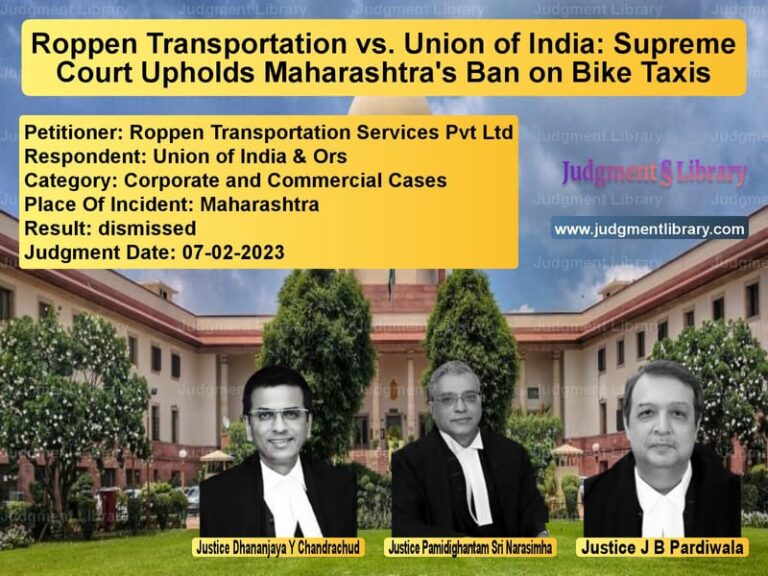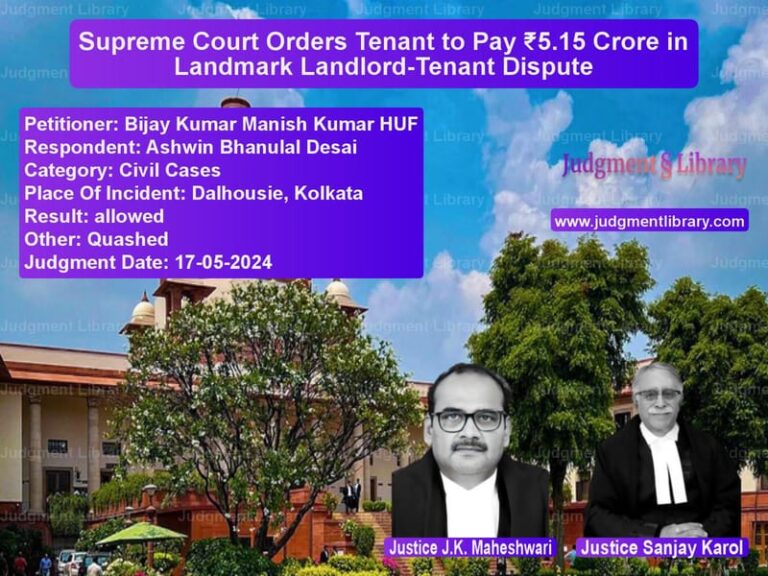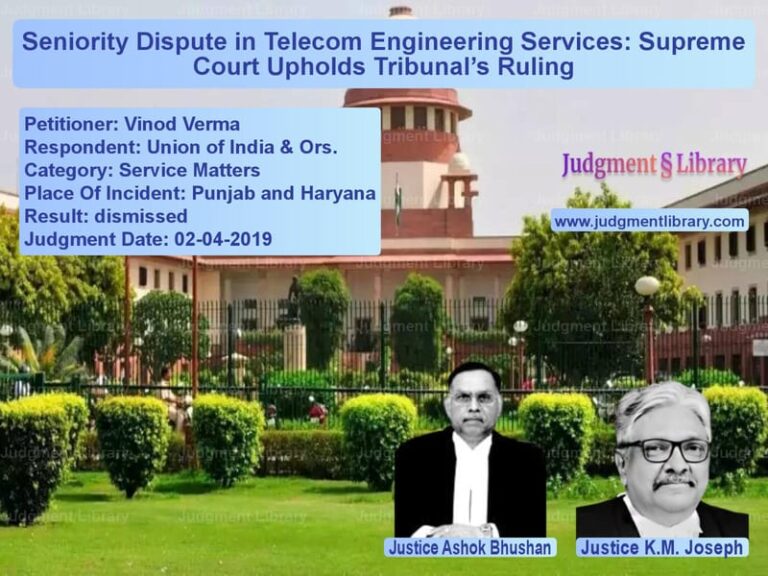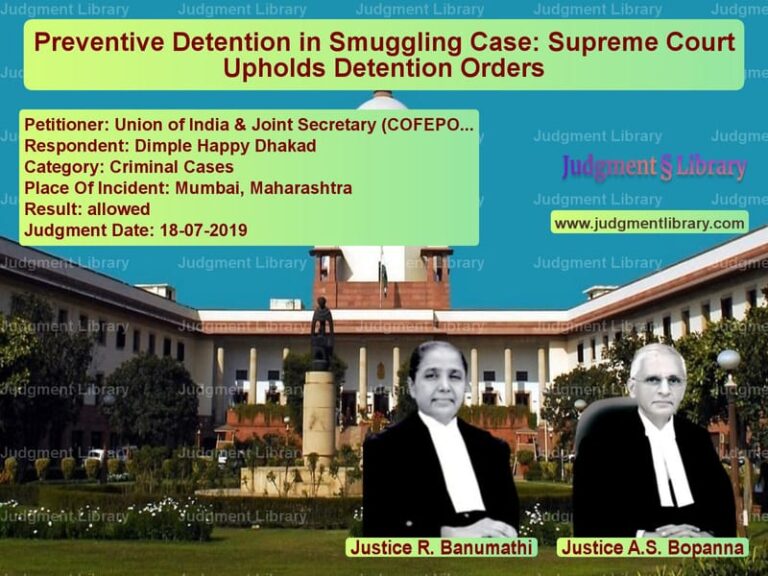Supreme Court Reinstates POCSO Case Against School Teacher: Key Legal Analysis
In a significant judgment delivered on April 23, 2025, the Supreme Court of India set aside the order of the High Court that had quashed FIRs against a school teacher accused of sexual misconduct under the Protection of Children from Sexual Offences Act (POCSO Act), 2012. The case, titled X vs. Rajesh Kumar & Ors., involved allegations of inappropriate behavior by a computer teacher towards female students in a school in Tirur. The Supreme Court’s decision underscores the importance of protecting child victims and ensuring that cases under the POCSO Act are not prematurely dismissed without a fair trial.
The Facts of the Case
The case began when female students of M.M.M. Higher Secondary School, Koottayi, accused their computer teacher, Rajesh Kumar (respondent No.1), of inappropriate behavior. The students alleged that he would hold their hands inappropriately while they used the computer mouse in the lab, asked intrusive questions such as how many sanitary napkins they used in a year, and sent vulgar images on a WhatsApp group meant for students. The students had inadvertently provided their parents’ phone numbers, leading to the images being seen by their families. Complaints were made to the school principal, who discovered women’s magazines and questionable CDs in the computer lab. A show-cause notice was issued to the teacher, who apologized and promised to improve his conduct.
However, the teacher allegedly continued his misconduct, leading to police intervention and his eventual arrest. Shockingly, only one victim’s statement was recorded initially—a 19-year-old student—while others were overlooked. The Parents Teachers Association (PTA) filed a writ petition in the High Court, resulting in the registration of five FIRs against the teacher under Sections 7 and 8 of the POCSO Act. The teacher later claimed to have “settled” the matter with the 19-year-old student and sought quashing of the remaining FIRs. The High Court, after a mini-trial, quashed the FIRs, stating that it could not infer “sexual intent” from the alleged acts.
Supreme Court’s Observations
The Supreme Court strongly criticized the High Court’s decision, emphasizing that the teacher-student relationship inherently involves a power dynamic that must be carefully considered in such cases. The Court noted that the High Court had prematurely concluded that the acts did not involve sexual intent, despite clear allegations of physical contact and other inappropriate behavior. The Supreme Court highlighted Section 7 of the POCSO Act, which defines sexual assault to include acts involving physical contact with sexual intent, even without penetration. The Court observed:
“The allegations that respondent No.1 would hold the hands of female students in the computer lab while using the mouse clearly falls within the ambit of ‘any other act with sexual intent which involves physical contact’. In the context of a teacher-student relationship, where the teacher is in a position of authority and trust, such physical contact, when accompanied by other inappropriate behavior including asking invasive questions about sanitary napkins and sending vulgar images, provides sufficient basis to infer sexual intent for the purpose of proceeding with trial.”
The Court also expressed dismay at the High Court’s failure to consider the preliminary statements of the victims recorded under Section 164 of the Cr.P.C., which had already been completed before the High Court’s judgment. The Supreme Court stressed that the High Court had overstepped its jurisdiction by conducting a mini-trial and pre-judging the case without allowing the victims to testify.
Key Legal Principles
The judgment reaffirmed several critical legal principles:
1. Scope of POCSO Act: The Court clarified that sexual intent under the POCSO Act can be inferred from contextual factors, including the nature of the relationship between the accused and the victim. The teacher’s position of authority over the students made his actions particularly egregious.
2. Protection of Victims: The Court directed the trial court to treat the victims as protected witnesses, ensuring their identities were not disclosed and their statements recorded promptly. It also barred the accused from contacting the victims during the trial.
3. No Premature Quashing: The Supreme Court reiterated that FIRs under the POCSO Act should not be quashed at a preliminary stage, especially when prima facie evidence exists. The High Court’s decision to quash the FIRs without a full trial was deemed erroneous.
Directions Issued by the Supreme Court
The Supreme Court set aside the High Court’s order and directed the trial court to proceed with the case expeditiously. Key directions included:
– Framing of charges within two weeks.
– Recording the statements of all victims at the earliest.
– Conducting hearings at least twice a month to ensure a speedy trial.
– Suspending the accused teacher from school until the trial’s conclusion.
Conclusion
The Supreme Court’s judgment is a landmark ruling that reinforces the stringent provisions of the POCSO Act and the need to protect child victims from sexual exploitation. By overturning the High Court’s order, the Court ensured that the accused teacher faces a fair trial while safeguarding the rights and dignity of the victims. The case serves as a reminder of the judiciary’s role in upholding justice in sensitive matters involving minors.
The Court’s stern observations about the High Court’s approach and its emphasis on the teacher-student power dynamic will likely influence future cases under the POCSO Act. As the Court noted, “The issue has been apparently pre-judged by the High Court without even permitting the victims to enter witness box and depose about various instances, which are briefly noted in their preliminary statements.” This judgment underscores the importance of letting trials run their course, particularly in cases involving vulnerable victims.
Petitioner Name: X.Respondent Name: Rajesh Kumar & Ors..Judgment By: Justice SURYA KANT, Justice NONGMEIKAPAM KOTISWAR SINGH.Place Of Incident: Tirur.Judgment Date: 23-04-2025.Result: allowed.
Don’t miss out on the full details! Download the complete judgment in PDF format below and gain valuable insights instantly!
Download Judgment: x-vs-rajesh-kumar-&-ors.-supreme-court-of-india-judgment-dated-23-04-2025.pdf
Directly Download Judgment: Directly download this Judgment
See all petitions in Judgment by Surya Kant
See all petitions in Judgment by N. Kotiswar Singh
See all petitions in allowed
See all petitions in supreme court of India judgments April 2025
See all petitions in 2025 judgments
See all posts in Criminal Cases Category
See all allowed petitions in Criminal Cases Category
See all Dismissed petitions in Criminal Cases Category
See all partially allowed petitions in Criminal Cases Category







